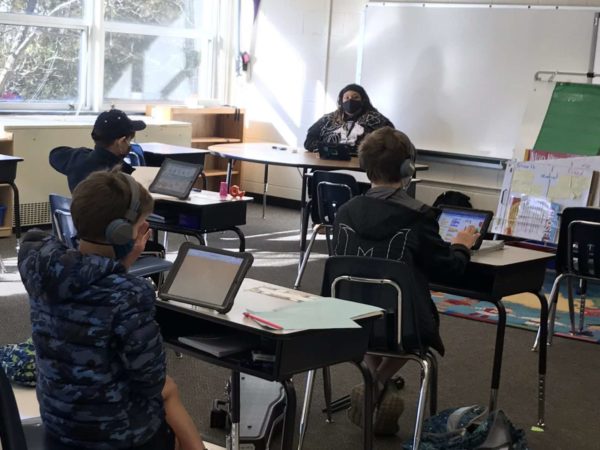A parent association is asking Arlington Public Schools to change its policy of providing every student with an iPad or MacBook.
Arguing that the devices are bad for children’s mental development and needlessly expensive, Arlington Parents for Education wants the Arlington School Board to roll back funding for them this budget cycle. It is requesting an end to the one-to-one policy for students in pre-kindergarten through 2nd grade, a reduction in devices for 3rd through 5th graders and a transition to PC laptops for grades 6 and up.
“APS says it uses ‘the right tool at the right time, for the right purpose,’ but it feels like we’re using technology just to use technology,” an APE representative said at a March budget hearing.
APS is budgeting $3.45 million for devices in the upcoming fiscal year. June Prakash, president of the Arlington Education Association, told ARLnow that she supports APE’s requests.
Prakash believes the one-to-one policy for early grades, approved in summer 2020, was “a great thing during the pandemic.” These days, though, she finds merit in claims that the tablets may be overstimulating, less effective than multi-sensory teaching tools and even harmful to young children’s development of social, linguistic and motor skills.
“I agree that it’s not the best use of funds for APS. I don’t think there’s any reason that a kindergartener should have an iPad,” Prakash said.
School Board candidates are split on the issue.
Candidate Chen Ling said heavy reliance on tablets in early grades is “suboptimal,” but helpful for classroom management given current class sizes. He also pointed out that some state testing starting in 3rd grade takes place on a tablet.
“What we should to do is to get more County funding so we can hire more teachers, reading and math specialists, and special education and English Learner teachers, so that we don’t need tablets,” he said.
Candidate Kathleen Clark added that transitioning to PCs in higher grades may not be as cost effective as it seems.
Research shows that our youngest students benefit from the act of physical writing by activating more senses, and also strengthening their ability to sequence concepts, which is a skill that translates into other development goals. However, our students must be comfortable on these devices by third grade because state mandated testing uses them. Test results should reveal areas of weakness regarding understanding the content, not the testing device. For later grades, the decision to shift from one device to another needs to take into account the cost of IT support systems and personnel — once those sizable costs are considered, any possible savings from a cheaper upfront procurement decision may be eliminated.
By contrast, Zuraya Tapia-Hadley sided with APE in arguing that extensive reliance on electronics does more harm than good.
I believe that the use of technology in the classroom should follow our instructional goals, not the other way around. The science is conclusive, and I have seen it in my experience as a parent, extended use of devices in young children can have a detrimental impact on learning. It’s important to get input from educators and learning experts to find a balance between using technology as a force multiplier in the classroom and its potential negative impacts on our students, particularly those in lower grade levels.
APE, which began during the pandemic to advocate for reopening schools, originally called on APS to study device usage back in 2022.
The school district formed an Educational Technology Advisory Committee last year to offer guidance. As of February, the committee was waiting to finish collecting and reviewing usage data before making any recommendations.


